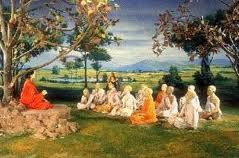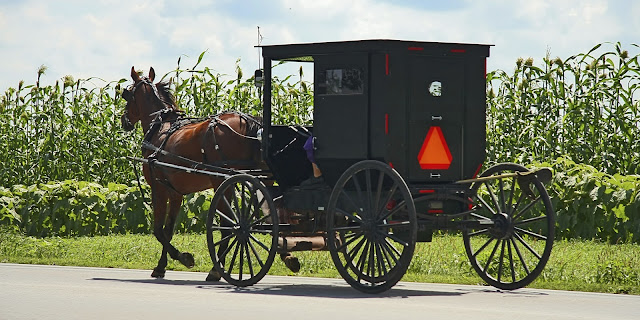We landed at New Delhi airport. It was late September. There
was a sense of joy for the Indians. The Canadians were looking forward for
exotica. None of them have visited India earlier.
Some expected India to be as exotic as described in Rudyard Kipling's Jungle
Book. After a brief stay in New Delhi we headed south to Kerala. We took a
train and due to prevailing flood, we took a circuitous route through one of the
oldest mountain ranges in India, the Aravallis and the Western Ghats.
 After three days on the train, we finally reached our
destination. We again headed to three places with our individual groups. Our group went to
a village called Kadampanad in Pathanamthitta district.
After three days on the train, we finally reached our
destination. We again headed to three places with our individual groups. Our group went to
a village called Kadampanad in Pathanamthitta district.
We never expected such a reception on our arrival. There was
the entire village waiting. Elaborately decorated Temple Elephants, even the
press waited for us. Flowers were showered. We were spellbound by this reception.
Me and Pat was put in a family, which incidentally had the
son George graduating in Theology. We attended Church service on the first
Sunday. But our coordinators excused us from future attendance as the service
was in Malayalam language, which me and Pat couldn't understand.
In fact, in India there are thousands of languages. A guy
from the north would not understand languages in the South. Similarly, with the
case of East and West. Some small States
have multiple languages, with people from one corner not understanding what the
guy from the other corner is saying.
Me pat and another Indian, Arun were paired up. Arun's
counterpart was kicked out of the programme. We tried our best to have him in
the programme, but in vain.
We were assigned to work in a brick kiln. Man! We only
managed to break the entire machinery the second day into our job. The owner said
we needn't work further and allowed us to loiter around. That we did.
Kerala is beautiful situated on the Arabian Sea. Lush greenery and dotted with coconut
trees and backwaters. Here the group didn't have the luxury of hang out in the evenings
like in Canada. So we met occasionally.
However, we were asked to volunteer in building an Ayurveda
Hospital in the village. Ayurveda is an ancient medical system from India. So each morning we were picked up in an army
truck from our host family's home from different parts of the village.
The Hospital was to be part of the Gandhi Ashram. So
Canadians and Indians together hauled dirt, carried bricks to help build the
Hospital. It was tiring, but overall satisfying.
In between, our only recreation was to go to a small town
called Adoor. Even in October-November the temperature hovered pleasantly between
28-30 degree Celsius.
In the meantime, the Canadians got used to eating with their
hands, without spoons and forks and need I say water in toilet. Our lunch was packed and consisted of Rice, Fish, Meat and Coconut chutney (pickle) wrapped
in banana leaves. We usually ate our launch inside the Rubber plantation.
 In Kerela we usually drank locally-made lemonade mixed with
soda. But, sadly, the Canadians were "advised" not to as they might fall
sick. Some of them loved a Mango cold
drink called Frooti.
In Kerela we usually drank locally-made lemonade mixed with
soda. But, sadly, the Canadians were "advised" not to as they might fall
sick. Some of them loved a Mango cold
drink called Frooti.
Here too we went to a camp. It was Theology College. The
three storied building was almost empty, eerie and situated inside a Coconut
plantation.
One night everyone thought of playing Planchet dead into the
night. I didn't like the idea.
 We switched off the lights in one of the floors and with just
a candle and "called the spirits." My hands shivered and the coin moved. They
proclaimed excitedly that it was the ghost of one who was murdered.
We switched off the lights in one of the floors and with just
a candle and "called the spirits." My hands shivered and the coin moved. They
proclaimed excitedly that it was the ghost of one who was murdered.
It was
enough for me. I left and rushed downstairs to the room to sleep, only to realize
I was alone in the entire floor. I rushed back to Planchet, the ghost seemed
far comforting.
We also went to several community programme, like the
community marriage in the village. In these marriages several grooms and brides
are married off the same day and there is a massive feast for the village with
contribution from everyone. Makes economic sense.
Days went by and Christmas arrived. The Canadians wanted it
to be grand and so we started practicing to sing carols. We spent hours in the
evenings learning carols like Jingle Bells, Santa is coming to Town, Deck the
Halls...
On Christmas we went to the Church and there was a lottery
event and I won the first prize. It was a big cake. Did I say that I won a
lottery in Canada too? The host family there bought a ticket in my name and I won the
first prize. Well I won a TV, but split the prize with the host family who
took a CD player, me and Pat a Walkman each.
 Well, the carol singing was a disaster. The Canadians were
fuming at us, as we Indians forgot the lyrics sang without tempo or beat. But
we apologized and things got to normal again.
Well, the carol singing was a disaster. The Canadians were
fuming at us, as we Indians forgot the lyrics sang without tempo or beat. But
we apologized and things got to normal again.
The village life was easy. There was life at every corner.
Lizards, snakes, yes King Cobra, beetles, bugs you name it. The walk to the
Gandhi Ashram was a pleasure with the tree canopy and the balmy weather.
After three months, we bid adieu to our host families and headed back to New Delhi.
In New Delhi at the end of the programme the Canadians wanted to do some
shopping and we were asked to assist our individual counterparts.
This is here I feel I learnt the most. Me and Pat headed to
Connaught Place. Pat sought for a cotton shirt. I was with him. Pat asked: “How
much?" The shopkeeper in his broken English seeing a foreigner said: "Rs.
1000...very good quality."
I saw the shirt, it was of good quality, but should not have cost
more than Rs. 500. The shopkeeper seeing the foreigner doubled the price. Pat
looked at me and I said immediately: "it is of good quality"
For Pat it was a good bargain and he bought it
together with my assurance.
In the evening at the International Youth Centre, were we were
putting up, we Indians got together and were discussing about the shopping. My friend
Sushant, who is now in the Indian Army, asked what me and Pat bought. I told
him about the shirt.
In fact, Sushant's counterpart bought a similar shirt from
the same place we bought. "How much
you guys paid," he asked. I told him Rs. 1000. Sushant asked why I didn’t
bargain, because he had got the shirt for his counterpart for Rs. 500.
"Come on it was an Indian who was getting the money. The
money is coming to India from outside. So what if he took Rs. 500 more. I helped an Indian
and India," I justified to Sushant, while everyone was sitting.
Sushant: " You didn't help an Indian or
India. You helped a Thief."
From that day till now, those were one of the most valuable learning
experiences of my life. I was ashamed at that time, even now.
I feel that we
cannot take sides based on our Nationality, Race, Community, Religion,
Language, Colour, but take sides for what is right. Whatever is wrong has to be
said, irrespective of whom we stand to hurt. No country is looking for Jingoism from its citizen. A sense of patriotism would do fine.
I should have bargained. I should have said to the shopkeeper
don't cheat your guest. I owe Pat Rs. 500, but more than that I owe an apology
to every right thinking individual - because I foolishly helped a
thief.











































